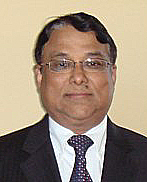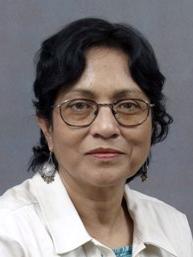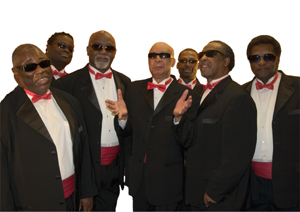|
Second
flu clinic slated for Dec. 10 in Convocation Center
The Arkansas Department of Health (ADH) will hold a second mass flu
immunization clinic Thursday, Dec. 10, in the Convocation Center on
the ASU campus from 9 a.m.-4 p.m. or until vaccine supplies run out.
Both H1N1 and the seasonal flu vaccines will be available to the
general public, and health department officials want to remind
people to wear clothing that will provide easy access to administer
the shot to the arm. The Yellow Entrance at the southwest corner of
the Convocation Center will be the only public entrance and exit. To
access the Yellow Entrance, motorists are asked to enter the
Convocation Center parking area off Olympic Drive. For more
information about mass flu clinics throughout the state, visit the
Arkansas
Department of Health online.
Dr. Zariff Chaudhury presents papers at two
conferences
Dr. Zariff (Zac)
Chaudhury, Metallurgical Technology, recently presented two
papers at two national conferences. “Auditing Challenges” was presented at the
18th An nual Audit Division Conference in Tucson, Ariz. Audit
Division works separately under the umbrella of American Society for
Quality (ASQ). The second paper, “Effects of Fiber Size and
Aging on the Mechanical Properties of NiTi Short Fiber and SiC
Particle Reinforced Al6061 Composite” was presented at
the Materials Science & Technology (MS&T’09 ) conference in
Pittsburgh, Pa. The paper was presented in the Powder Metallurgy
Processing and Products: Properties and Microstructure of PM
products area. This conference was organized by the American Ceramic
Society (ACerS), Association for Iron & Steel Technology (AIST), ASM
International (Materials Society) and the Minerals, Metals and
Materials Society (TMS). nual Audit Division Conference in Tucson, Ariz. Audit
Division works separately under the umbrella of American Society for
Quality (ASQ). The second paper, “Effects of Fiber Size and
Aging on the Mechanical Properties of NiTi Short Fiber and SiC
Particle Reinforced Al6061 Composite” was presented at
the Materials Science & Technology (MS&T’09 ) conference in
Pittsburgh, Pa. The paper was presented in the Powder Metallurgy
Processing and Products: Properties and Microstructure of PM
products area. This conference was organized by the American Ceramic
Society (ACerS), Association for Iron & Steel Technology (AIST), ASM
International (Materials Society) and the Minerals, Metals and
Materials Society (TMS).
Dr. Bhattacharya publishes peer-reviewed research article
Dr. Gauri Bhattacharya, Social Work, published a
peer-reviewed research article, "The Indian Diaspora in
Transnational Context: Social Relations and Cultural Identities of
Immigrants to New York City," in Transnational Migrants: The Indian
Diaspora. (W. Safran, A. Sahoo, & B. V. Lal, [Eds.] New Delhi,
India: Routledge, 2009). Dr. Bhattacharya examined transnationality,
cultural identity and social relationships, and acculturative stress
among Indian immigrants to New York City (NYC). The participants’
lives were examined in both US and Indian sociocultural and
political contexts. Individual face-to-face interviews elicited
participants’ narratives of their social relationships with family
in India, peers and ethnic communities in the US, and their
pre-immigration expectations of life in the US versus
post-immigration experiences. According to the study findings, NYC’s
Diaspora community retained India’s social class system, based on
income, educational, and occupational hierarchies, despite the
widespread stereotype of this community as monolithically affluent
and professional. Identifying their personal cultural identity as
Indian and American, participants felt pride in and solidarity with
NYC’s growing, increasingly visible Indian community. Transnational
connections enabled participants to maintain family relations
despite geographical separations. Family relations fostered
participants’ post-immigration adjustment, reducing their
acculturative stress. Programs for acculturating immigrants need to
take community heterogeneity into account, strengthening social
relations in both India and the US, and understand the Indian
Diaspora in terms of global and transnational contexts, changing
demographics, and emerging political and environmental situations. Bhattacharya examined transnationality,
cultural identity and social relationships, and acculturative stress
among Indian immigrants to New York City (NYC). The participants’
lives were examined in both US and Indian sociocultural and
political contexts. Individual face-to-face interviews elicited
participants’ narratives of their social relationships with family
in India, peers and ethnic communities in the US, and their
pre-immigration expectations of life in the US versus
post-immigration experiences. According to the study findings, NYC’s
Diaspora community retained India’s social class system, based on
income, educational, and occupational hierarchies, despite the
widespread stereotype of this community as monolithically affluent
and professional. Identifying their personal cultural identity as
Indian and American, participants felt pride in and solidarity with
NYC’s growing, increasingly visible Indian community. Transnational
connections enabled participants to maintain family relations
despite geographical separations. Family relations fostered
participants’ post-immigration adjustment, reducing their
acculturative stress. Programs for acculturating immigrants need to
take community heterogeneity into account, strengthening social
relations in both India and the US, and understand the Indian
Diaspora in terms of global and transnational contexts, changing
demographics, and emerging political and environmental situations.
Fowler Center Series presents Blind Boys of Alabama
The Fowler Center
Series presents its fourth event of the 2009-10 season in Riceland Hall
on Tuesday, Dec. 8, at 7:30 p.m., when it presents the Gospel Music Hall
of Fame legends, the Blind Boys
of Alabama, in their Christmas show, “Go Tell It On the Mountain.”
Riceland Hall, Fowler Center, is located at 201 Olympic Drive,
Jonesboro. This performance is also part of the Riceland Distinguished
Presentation Series.
Formed at the Alabama
Institute for the Negro Blind some six and a half decades ago, the
Blind Boys of Alabama are the Iron Men of the music industry. While a
huge gospel sensation back in the 1940s and ‘50s, the Blind Boys—led by
founding members Clarence
Fountain, Jimmy Carter, and George Scott—moved into the mainstream in
2001 with the first of three consecutive Grammy-winning recordings,
“Spirit of the Century,” a blend of gospel, blues, soul, and folk that
won Best Traditional Soul Gospel Album. It became the best-selling album
of the Blind Boys’ career, and it turned these septuagenarians into folk
heroes in hipster circles, landing them the opening slot on Peter
Gabriel’s 2002 worldwide arena tour.
Further acclaim and another Grammy win for Best Traditional Soul
Gospel Album followed in 2002 with the release of “Higher Ground.”
In 2003, The Blind Boys scored their
third consecutive Grammy win for Best Traditional Soul Gospel Album for
“Go Tell It On the Mountain.”
Their induction into the Gospel Music Hall of Fame and their
National Endowment for the Arts Heritage Fellowship for Lifetime
Achievement only confirms that the Blind Boys of Alabama have earned the
true distinction of “living gospel legends.”
Visit the Blind Boys
of Alabama online,
learn more about the
individual members of the group,
and listen to them
online, too.
Visit Fowler Center online for
additional information, call Fowler Center at ext. 3471, or see the
NewsPage release. Mountain.”
Riceland Hall, Fowler Center, is located at 201 Olympic Drive,
Jonesboro. This performance is also part of the Riceland Distinguished
Presentation Series.
Formed at the Alabama
Institute for the Negro Blind some six and a half decades ago, the
Blind Boys of Alabama are the Iron Men of the music industry. While a
huge gospel sensation back in the 1940s and ‘50s, the Blind Boys—led by
founding members Clarence
Fountain, Jimmy Carter, and George Scott—moved into the mainstream in
2001 with the first of three consecutive Grammy-winning recordings,
“Spirit of the Century,” a blend of gospel, blues, soul, and folk that
won Best Traditional Soul Gospel Album. It became the best-selling album
of the Blind Boys’ career, and it turned these septuagenarians into folk
heroes in hipster circles, landing them the opening slot on Peter
Gabriel’s 2002 worldwide arena tour.
Further acclaim and another Grammy win for Best Traditional Soul
Gospel Album followed in 2002 with the release of “Higher Ground.”
In 2003, The Blind Boys scored their
third consecutive Grammy win for Best Traditional Soul Gospel Album for
“Go Tell It On the Mountain.”
Their induction into the Gospel Music Hall of Fame and their
National Endowment for the Arts Heritage Fellowship for Lifetime
Achievement only confirms that the Blind Boys of Alabama have earned the
true distinction of “living gospel legends.”
Visit the Blind Boys
of Alabama online,
learn more about the
individual members of the group,
and listen to them
online, too.
Visit Fowler Center online for
additional information, call Fowler Center at ext. 3471, or see the
NewsPage release.
Back to the top |

